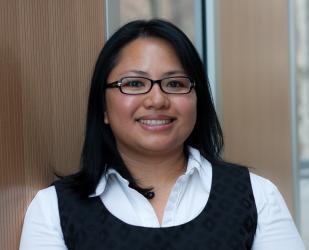SOP Faculty Win Medication Adherence Educators Challenge
AACP and NCPA program recognizes innovations in teaching medication adherence

By Becky Ceraul
June 13, 2012
Amy Ives, PharmD, affiliate assistant professor of pharmacy practice and science (PPS), and Cherokee Layson-Wolf, PharmD, associate professor in PPS and assistant dean for experiential learning, were recognized this month by the American Association of Colleges of Pharmacy and the National Community Pharmacists Association as one of three winners of its joint Medication Adherence Educators Challenge. The competition is designed to highlight best practices in medication adherence teaching among the nation’s 127 colleges and schools of pharmacy.
“Highlighting the many ways our faculty approach teaching future pharmacists about their role in improving patient adherence stimulates other faculty to enrich this critically important element of the PharmD curriculum,” said AACP Executive Vice President and CEO Lucinda L. Maine, PhD, RPh. “Adherence education is pertinent in didactic, laboratory, and experiential learning.”
The challenge is the first of its kind to recognize the teaching strategies currently being utilized or developed to prepare student pharmacists to detect, monitor, and improve patient medication adherence in pharmacy practice. In total, 37 entries from 26 colleges and schools of pharmacy were received and judged on criteria that included the impact, scalability, and innovation of the tool, as well as the tool’s application in an interprofessional learning environment.
The University of Maryland’s submission from Ives and Layson-Wolf featured an adherence-related lab activity in which students were given case studies and hands-on learning activities to experience real-world barriers to patient medication adherence. Students were asked to wear lab goggles obstructed with stickers in order to simulate a patient with vision problems. Similarly, students were asked to wear work gloves while filling a pill organizer in order to experience the dexterity challenges of a patient with arthritis.
“We are proud that Drs. Ives and Layson-Wolf have been selected as Innovative Medication Adherence Educators Challenge winners for their efforts in educating our student pharmacists on working with patients who have physical barriers that might prevent them from taking their medication properly,” said Natalie D. Eddington, PhD, FAAPS, FCP, professor and dean of the University of Maryland School of Pharmacy. “Their innovative approach to enhancing adherence for patients with disabilities is a prime example of how the School of Pharmacy educates its students to meet the needs of the patients they will serve in real-world settings.”
“With increasing importance being placed on the issue of medication adherence, it is very encouraging to see that tomorrow’s pharmacists have the opportunity to experience these innovative teaching strategies,” NCPA CEO Douglas Hoey said. “We look forward to working with AACP and continuing to showcase these and other innovative adherence teaching tools as a way to elevate the role of the pharmacist as an expert team member who can effectively identify and resolve medication issues.”
